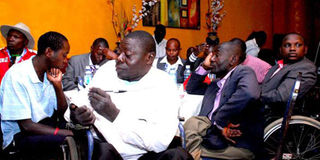Disabled people must be included in society

Disabled people follow proceedings during a past forum at the KICC in Nairobi. December 2, 2015 is the International Day of People with Disability. The day is intended to support their dignity, rights and wellbeing. PHOTO | SALATON NJAU | NATION MEDIA GROUP
What you need to know:
- International Day of People with Disability is intended to support their dignity, rights and wellbeing.
- The disabled have a right to equal access to transportation, employment, education, social and political participation.
- The Constitution recognises the right to be treated with dignity, equal access to educational facilities, and reasonable access to all places.
One billion people around the world are living with disabilities.
According to the Kenya National Survey for Persons with Disabilities, there are more than a million disabled people in Kenya. Many of these people have good jobs.
However, far too many of them face barriers to inclusion in many key aspects of society.
As a result, they do not enjoy access to society on an equal basis with the able.
This includes transportation, employment, education, and social and political participation.
The right to participate in public life is essential to create stable democracies, active citizenship, and reduce inequality.
Today is the International Day of People with Disability.
SUPPORTING THE RIGHTS OF THE DISABLED
It is a day to increase awareness about the challenges that these people face and should serve to remind us to include and support their dignity, rights, and wellbeing.
In 2006, the United Nations adopted the Convention on the Rights of Persons with Disabilities.
In 2008, Kenya ratified the convention, essentially making it part of Kenyan laws.
The purpose of this convention is to promote, protect, and ensure the full and equal enjoyment of all rights and fundamental freedoms by all disabled people and to promote respect for their inherent dignity.
Many laws in Kenya seek to protect the rights of people with disabilities.
The Constitution not only proscribes disability-based discrimination but also recognises braille, sign language, and other formats as official languages.
The Constitution recognises the right to be treated with dignity, equal access to educational facilities, and reasonable access to all places.
Furthermore, it entrenches affirmative action on principle to facilitate the progressive realisation of at least 5 per cent of disabled people in elective and appointive posts.
The Persons with Disabilities Act 2003 provides a framework for access to services and inclusion in all facets of life, as does the Basic Education Act and the Election Act.
FACING EXCLUSION AND DISCRIMINATION
However, despite these legal achievements, disabled people in Kenya continue to face exclusion and discrimination.
Women and girls suffer double discrimination i.e. gender and disability.
Those with intellectual or psychosocial disabilities continue to be locked away in psychiatric institutions. Students are still not allowed in mainstream schools and colleges and for those who gain admission, the environment is inaccessible.
Attitudinal barriers make it difficult for people with disabilities to gain meaningful employment. Buildings and public transport remain inaccessible.
Yes, life can be challenging for many disabled people — but not because they are sick, helpless, or waiting for handouts.
Just the opposite these people want to go to school and work, to have friends and fall in love, and to live in their own homes and be a part of their communities.
They are here to stay and growing in numbers.
They are not only among us, they are us — if not now, then as we grow old.
We need to work together to accept and include them in our communities and lives.
We need to value them for their individual skills, talents, and contributions.
Only then will they feel included and empowered. That is what the International Day of People with Disability requires.




